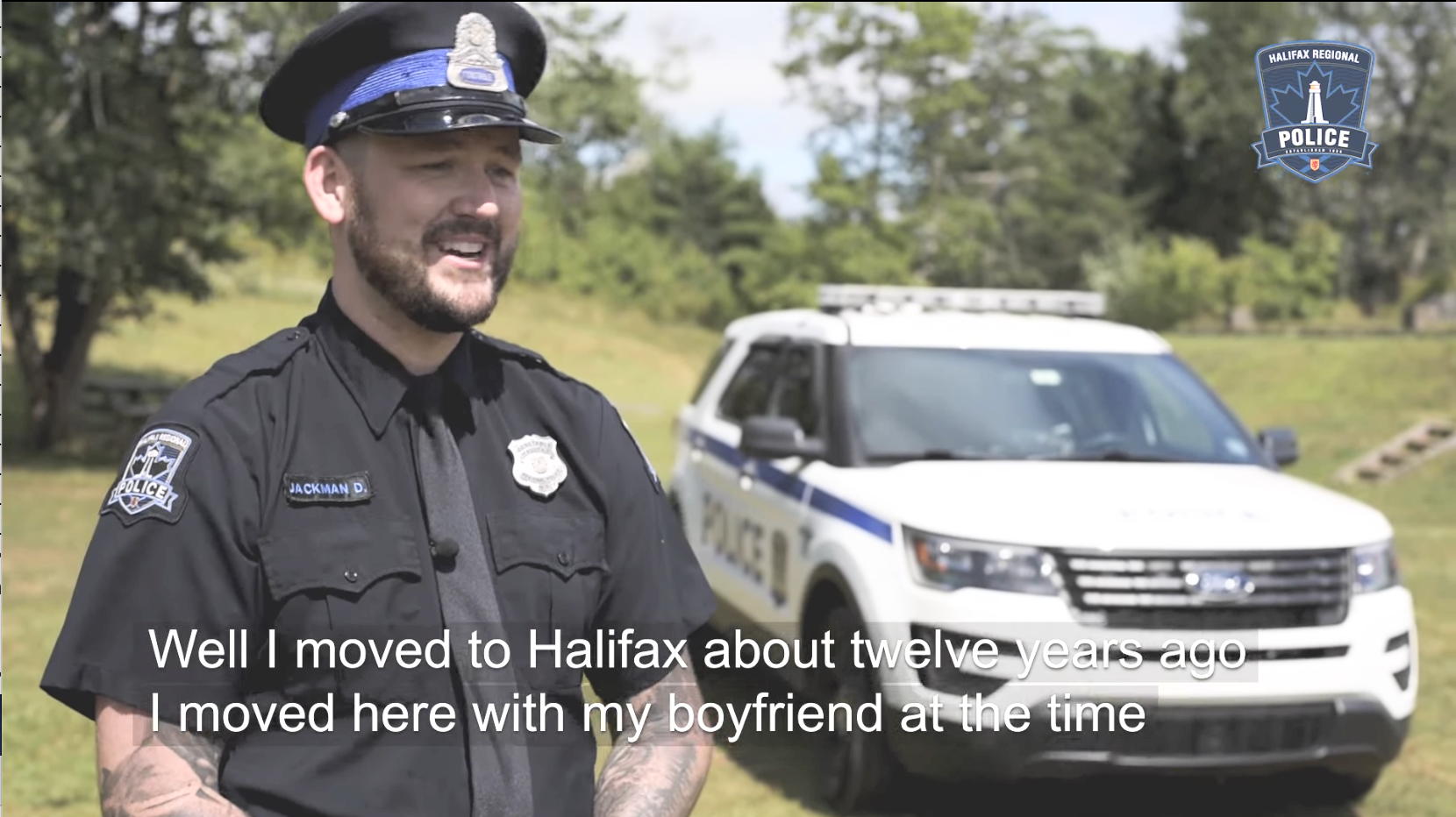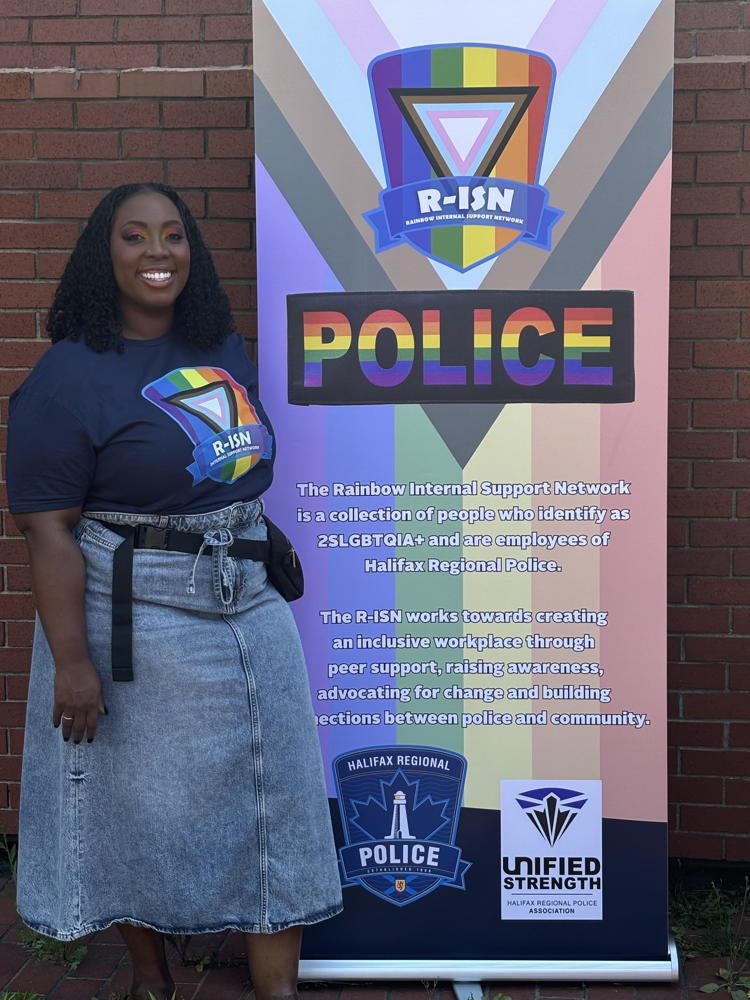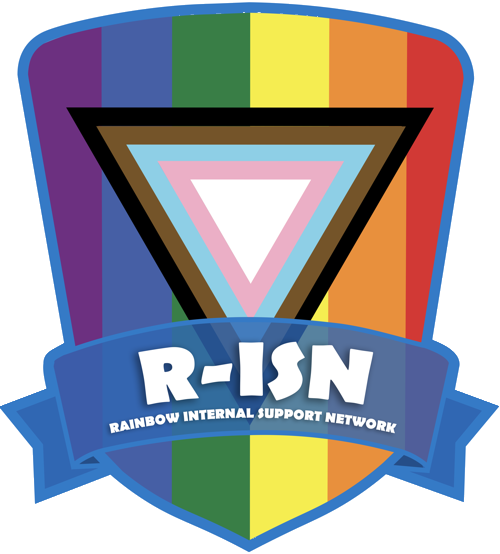In March, the Halifax Regional Police Department Rainbow Internal Support Network contacted Wayves about doing an article. We did one -- very, very, very slowly, by email.
What is the mandate of the Rainbow Internal Support Network (R-ISN), how long has it been operating, and how did it get started?
The primary goal of the R-ISN is to transform the experiences of 2SLGBTQIA+ employees at HRP. We aim to provide robust support, mentorship, and networking opportunities for our members while identifying and addressing training gaps. Our mission includes fostering more inclusive work environments through awareness and advocacy.
We recognize that improving the experiences of 2SLGBTQIA+ employees requires not only internal support but also building trust with external community partners. To this end, we have actively supported police officers and staff in handling cases involving 2SLGBTQIA+ community members, delivered organization-wide 2SLGBTQIA+ training in 2023, and engaged with various community stakeholders to rebuild relationships.
improving the experiences of 2SLGBTQIA+ employees requires not only internal support but also building trust with external community partners
One recent initiative, the Rainbow Name Tag Project allows officers—both R-ISN members and allies—to wear name tags featuring a rainbow symbol. This initiative aims to communicate their allyship to the public and help break down barriers to reporting crime.
The R-ISN has been officially around since 2023, fully recognized as an Internal Support Network by management. However, there has been internal discussion amongst 2SLGBTQIA+ employees since 2017 when HRP stopped marching in Pride. This event sparked internal dialogue among employees who felt there was no platform for their voices to be heard in decisions which involved 2SLGBTQIA+ issues. It’s been a long road to bring the R-ISN into existence, but through perseverance and support from some key allies, we’ve proven the value of our internal support and knowledge, making significant contributions to the organization and employees.
What role do you each play in the organization?
Trena: I have worked as a patrol officer, as a community response unit member, in general investigations section (GIS), in the sexual assault unit and I am now assigned to patrol as a Sergeant. Engaging with the public is what I enjoy most about my work. It sounds corny but you never know the impact you’re going to have on people when you are dealing with them, and I try to remember this always.
Dylan: I am a community relations and crime prevention Officer and I have been working with HRP since 2015. I have worked patrol, media relations, and community policing. I have a unique role within Policing where I get to work with various community groups and stakeholders in the community. I enjoy the community aspects of Policing and looking at crime prevention through a community lens, and working with community members where they are to find solutions. 
Tap the still here for a Facebook video of Dylan talking about his calling.
What types of training do you provide for police officers?
In 2023, The R-ISN conducted training focused on the history of policing in relation to the 2SLGBTQIA+ community, emphasizing the importance of this historical context. Understanding the challenges faced by the community is essential for fostering trust and improving relations.
The presentation also included crucial information on gender identity and terminology that officers should be familiar with. Additionally, it addressed legislation that safeguards the rights of 2SLGBTQIA+ individuals, highlighting the ongoing commitment to support and protect these communities. We are dedicated to enhancing our training programs and collaborating with the community to ensure that the information we provide is accurate and up-to-date.
How does your work connect with the greater 2SLGBTQIA+ community in HRM?
Our work isn’t just limited to internal training and support, although both of these can help foster better interactions with community members and helps our own employees who are part of the 2SLGBTQIA+ community. We have also been asked to advise on policies, issues, and police files that are related to the 2SLGBTQIA+ community. These can all effect how 2SLGBTQIA+ community members experience policing and allows us to have a wider impact on relationship building and change. Most importantly, we have a positive relationship with HRP’s management team. This connection allows us to champion issues which can more meaning fully effect change which connect to community more broadly. For example, this summer one of our R-ISN members saw the petition by the Youth Project for governments to remove fees from 2SLGBTQIA+ community members legally changing their names.
The 2SLGBTQIA+ community is quite intersectional, so it’s really important as a support group that we acknowledge this and put more work into making space for folks with intersectional identities
This R-ISN member brought it forward for our group and asked us to champion this issue. We approached management asking for HRP to waive fingerprinting fees for folks engaged in legally changing their gender or name as part of transitioning. Management agreed with us and we worked together, with additional informal community consultation, to waive the fingerprinting fees and improve the process for community members coming to the police station to get fingerprinting done. This would not have been possible without the R-ISN advocating for this and management being willing to listen and be partners in positive change. This is the type of work that the R-ISN hopes do, and wants to build on in the future.
How as a team do you approach intersectionality when considering the education of very different communities?
 This is a really great question! The 2SLGBTQIA+ community is quite intersectional, so it’s really important as a support group that we acknowledge this and put more work into making space for folks with intersectional identities. As we know about intersectionality, individuals with multiple marginalized identities have an exponentially harder time interacting with and being a part of institutions like policing. We try to make space for their voices within our R-ISN and incorporate intersectional perspectives into the training we deliver to our fellow colleagues. We also have a Board position dedicated to a 2SLGBTQIA+ BIPOC employee. We felt that it was important to intentionally make space on our Board for that voice and perspective.
This is a really great question! The 2SLGBTQIA+ community is quite intersectional, so it’s really important as a support group that we acknowledge this and put more work into making space for folks with intersectional identities. As we know about intersectionality, individuals with multiple marginalized identities have an exponentially harder time interacting with and being a part of institutions like policing. We try to make space for their voices within our R-ISN and incorporate intersectional perspectives into the training we deliver to our fellow colleagues. We also have a Board position dedicated to a 2SLGBTQIA+ BIPOC employee. We felt that it was important to intentionally make space on our Board for that voice and perspective.
As members of the 2SLGBTQIA+ community, where do you see the biggest disconnect between police and the queer community?
We think a lot of this disconnect comes down to what it is that police have represented throughout Canadian history. Canadian policing institutions are historically a colonial system which has been engaged in oppressing many communities over the years. Since many of Canada’s laws have been grounded in social norms and practices, police have been the enforcers of discriminatory and racist laws. Whilst policing has changed quite a lot over the years, there is a lot of damage and trust to rebuild. We can always do better with continuing to update and improve our policies and practices. Our hope is that the R-ISN can start to bridge the gap between the 2SLGBTQIA+ community and the police in Halifax.
Whilst policing has changed quite a lot over the years, there is a lot of damage and trust to rebuild.
Through training, tough conversations and a genuine desire to improve, we believe policing can get there. We want police to make everyone feel safe, and while we have a long way to go, our R-ISN is there to help support both the community and our colleagues in this. We think the R-ISN has a unique perspective, where we understand what it’s like to be both police officers and members of the 2SLGBTQIA+ community. We have so many police colleagues who are amazing people and want to protect all of society, but don’t know how they can be an ally or navigate tough conversations with community members. Our colleagues need our help and support through this, while at the same time, we can hold our organization and colleagues accountable to change. That is a unique role our R-ISN wants to champion.
There have been long standing feelings of mistrust and skepticism of police in marginalized communities like ours. How do you work within that feeling of mistrust as members of the 2SLGBTQIA+ community? How does education around the history of that mistrust enter into your activities and training?
The mistrust is a huge barrier to building positive relationships with the queer community. This is one of the reasons why the R-ISN has taken the lead in rebuilding these relationships. We hope that as members of the community ourselves, folks may feel more comfortable establishing a connection with us. But it’s something we are constantly working on, and we have much work to do to build trust and authentic connections. But internally, when we deliver training to our fellow police colleagues, it’s very important to talk about that historical and contemporary real fear and mistrust of police. Often what we hear from officers is that they tried really hard to have positive interaction with a queer member but don’t understand why they were met with fear, mistrust or anger. It’s crucial to talk about the history of policing in Canada and the queer community, so officers can understand the origin of the mistrust. We can acknowledge it exists and try to understand that in every interaction we have with community members. Without knowing history, police are left in the dark about how to navigate challenging interactions. Our education and activities always aim to bridge the gap between community and police. As well, we use our own stories and experiences to help paint that picture of why mistrust exists.
It’s been an ongoing concern and belief that based on the size of the city, hate crimes are generally underreported in Halifax. Does any of your training connect to education around hate crimes?
In general, any training we do which helps educate officers and front-line employees on 2SLGBTQIA+ perspectives helps contribute to better police interactions. It reduces reporting barriers in general. The education we deliver isn’t specifically geared toward hate crimes. However it helps to provide officers with the tools and knowledge to understand queer issues and perspectives, and so indirectly may help increase reporting. There is internal training which is lead by the Hate Crime Unit which is geared more specifically to training officers and front staff on Hate Crimes.
Every officer is a steward of that relationship with the community.
What can the general members of the police force do to proactively encourage reporting hate crimes?
As we stress in our training, building positive relationships and trust within the community is key to encourage not just reporting hate crimes, but any crime. Every officer is a steward of that relationship with the community. Every time officers interact with the community in a positive way, they are actively encouraging reporting hate crimes. We stress this notion when we are involved in educating our fellow officers. We also ask officers to reach out to the R-ISN if they need help and guidance. We want officers to ask questions and be open to learning or receiving help. This can help them have better interactions and for police files to have better outcomes. Little by little, officers having positive interactions with community can help build trust and increase reporting.
Are you familiar with or connected to other organizations like the 2SLGBTQIA+ law enforcement nonprofit Out on Patrol? It began in BC and is a peer support organization for 2SLGBTQ+ members of law enforcement, focused on community engagement, charitable work, and education.
While we are not directly connected to the Out on Patrol program, we conducted a nationwide search when we launched the R-ISN and engaged with various similar organizations. Currently, we have established support for 2SLGBTQIA+ employees and implemented internal education sessions, which were our top priorities for the R-ISN.
Now that we have built a solid foundation, we are excited to expand our focus to community engagement initiatives as our capacity continues to grow.
As members of the 2SLGBTQIA+ community, what steps could the queer community take to actively combat, and safely report, hate crimes?
We would like to leave this question for our Hate Crimes Unit to answer as increasing hate crime reporting is more within their purview. But, what we can say is that there are ways to report hate crimes, even if you don’t speak directly to an officer about it. Crimes Stoppers is one tool people can use if they don’t feel safe to call police. We’ve also had community members reach out to the Victim Services Unit. They are able to connect with R-ISN members or through officers they can trust. We’ve also had members of the queer community help connect community members to police officers they trust. We really want to encourage members of the queer communities to report hate crimes. It’s crucial to understand what 2SLGBTQIA+ members are experiencing and where we can focus our resources.

 Interview by Kenney Fitzpatrick • Halifax • 2024-11-25
Interview by Kenney Fitzpatrick • Halifax • 2024-11-25